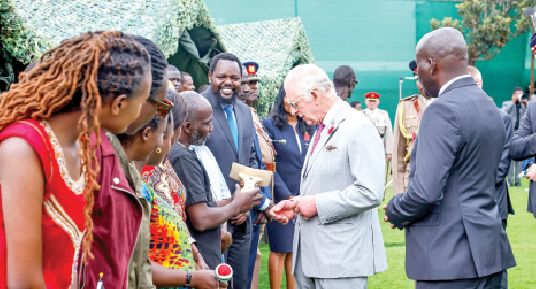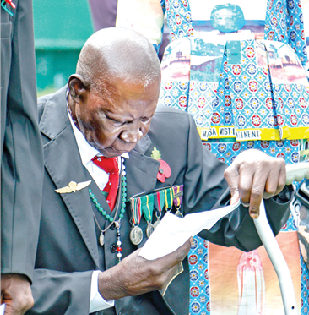King comes face to face with ugly colonial history

When Mzee Samwel Nthigai Mburia was wheeled to the Kariokor War Memorial Cemetery in Nairobi alongside other veterans, he was confronted with the graves of former comrades.
But while death is said to be an equaliser, former comrades were discriminated – by colour – as they lay in graves after falling victims of deadly wars which some of them had no idea about, their causes nor the fruits of victory.
Mburia, now 117, was among Kenyans who were conscripted to fight in the World Wars for the British during the colonial era. These is where the World War veterans were buried.
While the families of the fallen British soldiers were compensated, those of their Kenyan counterparts did not receive a dime nor their contribution honoured.
They were left clinging to the hope of archaic, valueless medals which nobody cared to recognise but remained dear to them, at the least for the memories of valour in a war they lost some of their relatives and friends as well as broken families.
During the Mau Mau insurgence, many of the veterans who fought alongside the British threw away their medals for fear of reprisal by the freedom fighters.
The only evidence they possessed in defence for compensation claims was lost.
The World War veterans are now on wheelchairs, their scars being nursed by their poor family members.
Historical injustices
These are some of the historical injustices that King Charles who came to Kenya, the first visit to a commonwealth country since he was coronated, was forced to confront.
King Charles who declared that he is in the country to understand part of its “painful history” yesterday visited the cemetery and delivered replacements for the medals Mburia and his band of comrades had lost at an emotional ceremony.
A statement by the King’s handlers, said that the Monarch was committed “to address the historical inequalities in commemorating those killed in the First and Second World Wars.”
The cemetery in Nairobi is situated near a former depot of the Carrier Corps of the World War 1 and has come to be known as Kariokor.
“Most of the Kariokor casualties were not individually compensated and their contribution was largely overlooked,” acknowledges the monarch. During the event, the King who was accompanied by his wife, Queen Camilla, laid a memorial wreath. At the ceremony, an officer recited the ode which was followed by a moment of silence, the Last Post before a Kenya Defence Forces officer played the bugler.

Besides abandoned comrades, the King was confronted by the ghost of colonialism when he visited Nairobi’s Uhuru Gardens on Tuesday.
During the visit, the royal couple was taken on a tour of the Tunnel of Martyrs, which is inscribed with names of heroes who lost their lives fighting for freedom from the British while his mother, Elizabeth, was the Queen.
According to its curators, the tunnel, symbolizes the journey from darkness to light, underlining the hopeful message that after a challenging period, there comes light or delight.
The King laid a wreath at the Tomb of the Unknown Warrior in the venue where Kenya declared independence from the British in December 1963.
On Tuesday night, the King fell short of offering an apology by the British during the deadly Emergency period from 1952-1960 that saw a crackdown, including killing, torture and arrest of Mau Mau freedom fighters.
Tender an apology
King Charles who has been under pressure by rights groups and families of freedom fighters to tender an apology, acknowledged that there was “no excuse” for the atrocities but pointed out that no one “can change the past.”
He instead, offered that the wrongs were of “greatest sorrow and the deepest regret.”
“However, we must also acknowledge the most painful times of our long and complex relationship. The wrongdoings of the past are a cause of the greatest sorrow and the deepest regret. There were abhorrent and unjustifiable acts of violence committed against Kenyans as they waged, as you said at the United Nations, a painful struggle for independence and sovereignty – and for that, there can be no excuse,” he said during a State dinner hosted by President William Ruto who had stirred reflections on the country’s UK-British relations in a pointed speech. According to the King, the matter should in future be handled with “openness and honesty.”
Earlier, President Ruto had reminded the monarch that the British presence in Kenya had led to European settlement and the displacement, dispossession and disenfranchisement of native Africans, paving the way for a “brutal colonialism.”
“If colonialism was brutal and atrocious to African people, colonial reaction to African struggles for sovereignty and self-rule was monstrous in its cruelty. It culminated in the Emergency, which intensified the worst excesses of colonial impunity and the indiscriminate victimisation of Africans,” said the President.
“While there have been efforts to atone for the death, injury and suffering inflicted on Kenyan Africans by the colonial government, much remains to be done in order to achieve full reparations,” he said.
Atrocities committed
The Kenya National Human Rights Commission had called on the King to use the opportunity of the trip to apologise for the atrocities committed to Kenyans during the Mau Mau struggle that led to Kenya’s independence.
KHRC Executive Director Davis Malombe said the British occupation of Kenya was characterised from inception by an extremely brutal and excessive force with punitive and violent expeditions that saw unprecedented crackdown of all individuals, communities and associations that resisted its political ventures.
“The atrocities committed by the British regime were so gross that the Truth, Justice and Reconciliation Commission (TJRC) described them as unspeakable and horrific gross violations of human rights,” said Malombe.
The royal family has been under pressure to reexamine the history of colonialism and apologise for its role in slave trade.
Kenya’s High Commissioner to London Manoah Esipisu has billed the tour as “extremely significant” noting that the monarch has the discretion to respond to calls for expression of regret.
“The Monarch himself had indicated in the Statement from the palace that he will reflect and understand the history but the focus should not be in the past. The King decides what to and not to do but the focus should be tomorrow,” says Esipisu.
“The King’s trip is an important signal that Kenya and the UK have a strong bond which like any relationship, has had its ups and downs. Kenya and the UK remain strong allies on areas such as investment, regional security and trade,” Esipisu told People Daily.
The King’s visit continues today in Mombasa.








